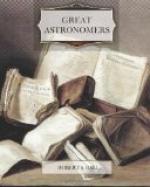Throughout his life Newton appears to have been greatly interested in theological studies, and he specially devoted his attention to the subject of prophecy. He left behind him a manuscript on the prophecies of Daniel and the Apocalypse of St. John, and he also wrote various theological papers. Many other subjects had from time to time engaged his attention. He studied the laws of heat; he experimented in pursuit of the dreams of the Alchymist; while the philosopher who had revealed the mechanism of the heavens found occasional relaxation in trying to interpret hieroglyphics. In the last few years of his life he bore with fortitude a painful ailment, and on Monday, March 20th, 1727, he died in the eighty-fifth year of his age. On Tuesday, March 28th, he was buried in Westminster Abbey.
Though Newton lived long enough to receive the honour that his astonishing discoveries so justly merited, and though for many years of his life his renown was much greater than that of any of his contemporaries, yet it is not too much to say that, in the years which have since elapsed, Newton’s fame has been ever steadily advancing, so that it never stood higher than it does at this moment.
We hardly know whether to admire more the sublime discoveries at which he arrived, or the extraordinary character of the intellectual processes by which those discoveries were reached. Viewed from either standpoint, Newton’s “Principia” is incomparably the greatest work on science that has ever yet been produced.
[Plate: Sir Isaac Newton’s sun-dial in the royal society.]
FLAMSTEED.
Among the manuscripts preserved at Greenwich Observatory are certain documents in which Flamsteed gives an account of his own life. We may commence our sketch by quoting the following passage from this autobiography:—“To keep myself from idleness, and to recreate myself, I have intended here to give some account of my life, in my youth, before the actions thereof, and the providences of God therein, be too far passed out of my memory; and to observe the accidents of all my years, and inclinations of my mind, that whosoever may light upon these papers may see I was not so wholly taken up, either with my father’s business or my mathematics, but that I both admitted and found time for other as weighty considerations.”
The chief interest which attaches to the name of Flamsteed arises from the fact that he was the first of the illustrious series of Astronomers Royal who have presided over Greenwich Observatory. In that capacity Flamsteed was able to render material assistance to Newton by providing him with the observations which his lunar theory required.




